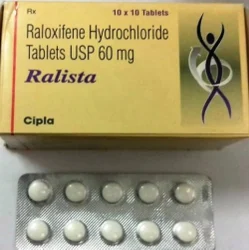Ralista 60mg Tablet is a medication used to treat:
- Postmenopausal osteoporosis (weakened bones)
- Breast cancer (in combination with other treatments)
Composition: Each 60mg tablet of Ralista contains 60mg of Raloxifene (an active pharmaceutical ingredient), which is a selective estrogen receptor modulator (SERM).
Mechanism of Action: Raloxifene works by:
- Binds to estrogen receptors in the body, mimicking the effects of estrogen
- Reduces the production of parathyroid hormone, which helps to regulate calcium levels in the blood
- Increases the production of osteoblasts, which are cells that build new bone tissue
- Decreases the production of osteoclasts, which are cells that break down bone tissue
Dosage: The recommended dose of Ralista is 60mg once daily.
Side Effects: Common side effects of Ralista include:
- Hot flashes
- Leg cramps
- Fatigue
- Headache
- Nausea
- Vomiting
- Dizziness
- Breast pain
Rare but serious side effects include:
- Venous thromboembolism (blood clots)
- Stroke
- Heart attack
- Osteoporosis-related fractures
- Cataracts
- Blurred vision
Recommendation: Ralista is recommended for postmenopausal women who have not responded to other treatments for osteoporosis or who have had unacceptable side effects. Patients with a history of venous thromboembolism or other medical conditions that may affect their ability to respond to treatment should be closely monitored while taking Ralista.
Important Note:
- Ralista should be used under the guidance of a healthcare provider with experience in the treatment of osteoporosis or breast cancer.
- Patients should be advised to report any symptoms of hypersensitivity reactions, such as rash, itching, swelling, or difficulty breathing.
- Ralista may interact with other medications, such as warfarin and certain antibiotics. Patients should inform their healthcare provider of all medications they are taking before starting Ralista therapy.
- Patients with a history of kidney disease or other medical conditions that may affect their ability to respond to treatment should be closely monitored while taking Ralista.
Special Precautions:
- Patients with a history of venous thromboembolism should be closely monitored while taking Ralista.
- Patients with a history of stroke or heart attack should be closely monitored while taking Ralista.
- Patients with a history of kidney disease should be closely monitored while taking Ralista.
- Pregnant or breastfeeding women should consult their healthcare provider before taking Ralista.



Reviews
There are no reviews yet.